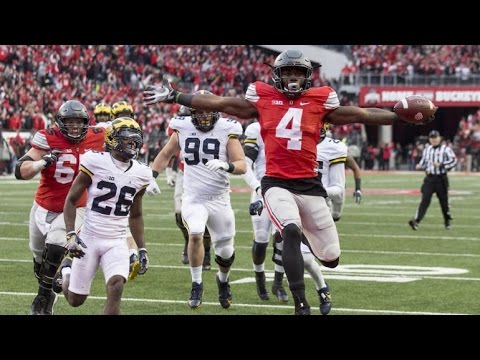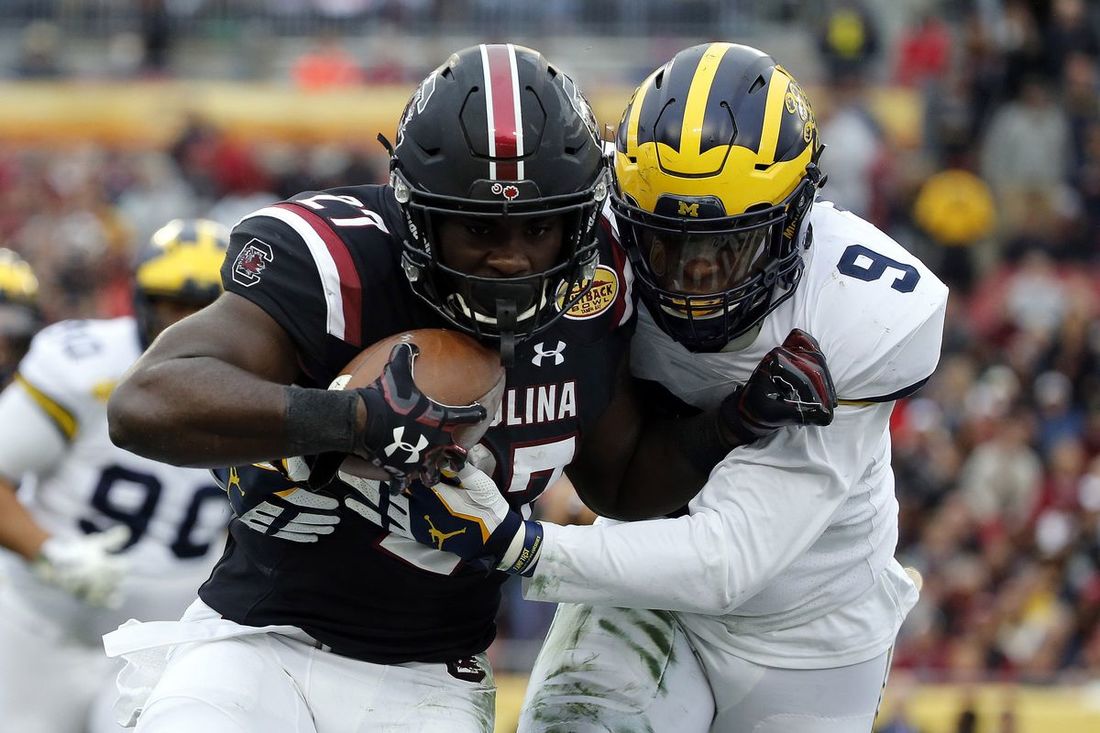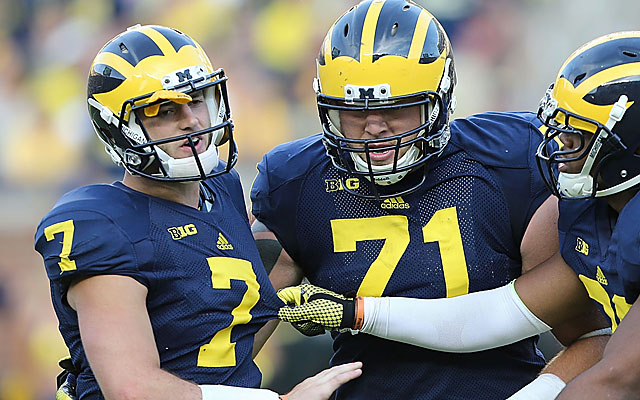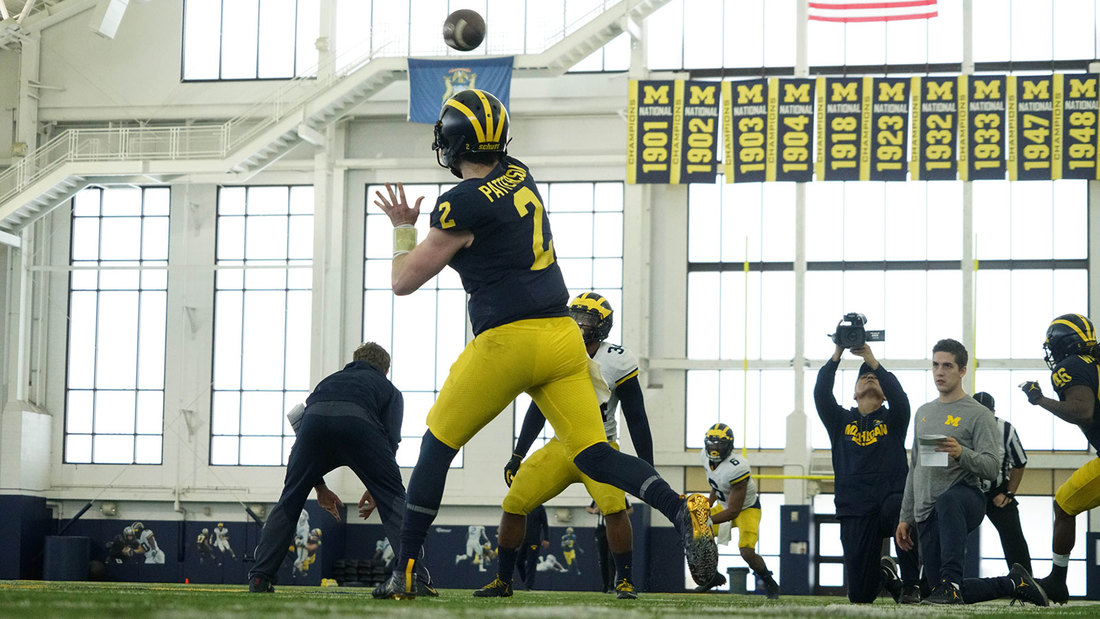At around 3:30 pm eastern standard time on November 24th, Jim Harbaugh and his Michigan football team will have faced their judgement day. Can he finally beat the Buckeyes? Will they take a December trip to the capital of Indiana between annual spring break trips to foreign cities? Will the quarterback and offensive line problems that have plagued Michigan for the last two years finally be solved by coaching staff and personnel changes?
All of these questions will be answered in due time. For now, let’s take a step back.
I’ve been among the starkest critics of Jim Harbaugh over his first three years as head coach of the Wolverines. I found the end of the 2015 Michigan State game inexcusable; how can you justify having gunners in your punt formation when there isn’t even a return man back? The 2016 Iowa game made me sick. The offensive play calling and execution were atrocious for much of the game. Blame a Wilton Speight shoulder injury, a bad facemask call, or the haunted ‘night-game at Kinnick’ if you’d like; that one is on the coaching staff for me. Two weeks after that, Michigan lost a heartbreaking game to Ohio State that has defined Harbaugh since. The refereeing was atrocious (and I won’t even talk about the spot at the end - the Buckeyes had 0 live ball penalties, watch this and tell me they had 0 live ball penalties: https://www.youtube.com/watch?v=5mhG1Pp6SJM) but I try to only consider factors within Michigan’s control. Wilton Speight may or may not have still been injured, and he had some horrific turnovers, but his 219 yards and 2 touchdowns were what built a 17-7 lead for Michigan. What do I look back to from that game? Michigan’s last three drives in the 4th quarter, all with a 17-14 lead.
5 plays, 16 yards in 2:02 ending in a punt
3 plays, -6 yards in 1:31 ending in a punt
3 plays, 6 yards in 1:25 ending in a punt
I have had a hard time evaluating the 2017-18 season. To be fair, Michigan lost 17 starters and was a young team with a tough schedule. But if we dig into that a little further, 10 of those lost starters were on defense. The defense finished top 10 across the board in nearly every stat, and was the 3rd best in the country on a total yardage basis. The offense… struggled to say the least. Quarterback injuries certainly put an asterisk on some of their struggles, but if Harbaugh had put in Brandon Peters against Michigan State would the outcome have been different? If Michigan’s offense didn’t sputter once again in the second half against the Buckeyes, is the ‘Harbaugh can’t win big games narrative’ erased? (For the record I think Michigan wins that game if JT Barrett doesn’t leave the game injured in the second half)
Even with all of these things in mind, I want to take a moment to defend Harbaugh. He inherited a dumpster fire. Rich Rodriguez lost to Toledo and went 3-9 in year 1, and then improved in each of the next two seasons before being fired by Dave Brandon just when things started to look promising (hindsight is 20/20). Brady Hoke left Shane Morris in a game against Minnesota with a concussion and his win totals regressed each of his last three years after an 11-2 inaugural season. Harbaugh had to scrap together his first recruiting class in a month. If any other school in the country hired a new coach after not winning their conference in a decade (you can even forget the rest of the circumstances), 28 wins in 3 years would be acceptable. But not at Michigan. Our alumni, donors, fans, and students expect national title contention or bust every year. In a sense, this expectation is warranted. The million dollar facilities, largest stadium in the country, ‘tradition of excellence’, and Jim Harbaugh’s annual salary make these expectations seem rationale. Take a deep breath though, Michigan has half a national championship since 1948. They’ve been dominated by their two biggest rivals for the last decade and counting. MSU has won 8 of the last 11 meetings while the Buckeyes having taken 15 of the last 17. On Thanksgiving Day in 2001, “The Game’s” all time-record stood at 56-32-6 in favor of Michigan. Much of that ‘tradition of excellence’ for the ‘winningest team in college football history’ came pre-World War 2.
Now back to the Xs and Os. It’s year 4 for Harbaugh. He finally has a roster full of his players. Michigan returns 17 starters this year and has a revamped coaching staff of proven minds in all three phases as well as strength and conditioning. Even new football nutrition director Abigail O’Connor has received raving reviews from the players and staff. Everything seems to be in place for an 11 or 12 win season and Harbaugh’s first conference championship game appearance.
Yet the task has never seemed more daunting. Michigan hasn’t won a road game against a ranked opponent since 2005; there are three likely top-25 road opponents (all rivalry games too) on the schedule this year in Notre Dame, OSU, and MSU. Add in home games against Penn State and Wisconsin to make it five total matchups with preseason top-25 teams. Don’t forget about up-and-coming Maryland, the Scott Frost led Nebraska Cornhuskers, and always tricky Indiana (overtime games two of the last three years) and you have what many believe is the toughest schedule in the country. Life just isn’t fair, right?
If he doesn’t, just remember what the program he inherited looked like. I’m personally guilty of harsh, unfair criticism of Harbaugh in the worst moments of defeat and failure. I’ll never stop breaking down the in-game coaching mistakes he has made (and will continue to make). But do not, for a even a second, forget what this program looked like for the first 7 years after Lloyd Carr retired. And if you want to criticize Harbaugh (I certainly have, and will continue to do so), do it fairly. Make it about the in-game play calling and execution, or, at a minimum, paint a fair picture of what Dave Brandon, Lloyd Carr, Rich Rodriguez, and Brady Hoke left him to work with.
I’ll see you on September 1st in South Bend.
Opinions are all my own, feel free to leave comments below or on Twitter @E____money and @wcbnsports.




 RSS Feed
RSS Feed
